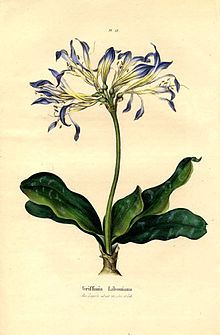Griffinia
| Griffinia | |
|---|---|

| |
| Griffinia liboniana[3] | |
| Scientific classification | |
| Kingdom: | Plantae |
| Clade: | Tracheophytes |
| Clade: | Angiosperms |
| Clade: | Monocots |
| Order: | Asparagales |
| Family: | Amaryllidaceae |
| Subfamily: | Amaryllidoideae |
| Genus: | Griffinia Ker-Gawl.[1] |
| Type species | |
| Griffinia hyacinthina (Ker Gawl.) Ker Gawl.[2] | |

| |
| Griffinia is endemic to Brazil[4] | |
| Synonyms[4] | |
| |
Griffinia is a genus of Brazilian plants in the Amaryllis family, subfamily Amaryllidoideae.[5] It includes 23 known species which are endemic to Brazil.[4] The most closely related genus to it is the monotypic Worsleya.




The members of the genus Griffinia are tropical, bulbous plants which grow in high levels of humidity. The leaves are green, petiolate, elliptical, sometimes with white speckles on them. The flowers are typical for the tribe - lilac or blue colored (although there are also white - colored species) and collected into an umbel. Many of the members in this genus are endangered because of the deforestation of their habitat.[6]
Taxonomy
Subgenera
The genus Griffinia is divided into Griffinia subgen. Hyline, in which only Griffinia gardneriana (Herb.) Ravenna and Griffinia nocturna Ravenna are placed, as well as Griffinia subgen. Griffinia, which includes all other species.[7]
Species
As of June 2023, the genus comprises 23 species:[4]
- Griffinia alba K.D.Preuss & Meerow
- Griffinia albolineata Campos-Rocha
- Griffinia angustifolia Campos-Rocha, Dutilh & Semir
- Griffinia aracensis Ravenna
- Griffinia arifolia Ravenna
- Griffinia capixabae Campos-Rocha & Dutilh
- Griffinia colatinensis Ravenna
- Griffinia concinna (Mart. ex Schult. & Schult.f.) Ravenna
- Griffinia espiritensis Ravenna
- Griffinia gardneriana (Herb.) Ravenna
- Griffinia hyacinthina (Ker Gawl.) Ker Gawl.
- Griffinia ilheusiana Ravenna
- Griffinia intermedia Lindl.
- Griffinia itambensis Ravenna
- Griffinia liboniana É.Morren
- Griffinia meerowiana Campos-Rocha & M.Peixoto
- Griffinia mucurina Ravenna
- Griffinia nocturna Ravenna
- Griffinia ornata T.Moore
- Griffinia parviflora Ker Gawl.
- Griffinia paubrasilica Ravenna
- Griffinia rochae G.M.Morel
- Griffinia rostrata Ravenna
Conservation
Griffinia intermedia is categorized as endangered (EN) by the IUCN Red List of Threatened Species. It is only known from two locations, in which the species, as well as its habitat is continually declining.[8] An initiative has been taken to replicate the fragrance of Griffinia gardneriana, which is threatened with extinction, for the creation of a perfume. The sale of the perfume is meant to financially contribute to the conservation effort for this species.[9]
References
- ^ Ker Gawler, John Bellenden 1820. Botanical Register 6, plate 444 + 2 subsequent text pages full-page color illustrion, description in Latin, commentary in English
- ^ Griffinia | International Plant Names Index. (n.d.). Retrieved June 27, 2023, from https://www.ipni.org/n/330432-2
- ^ illustration from Annales de la Société royale d’Agriculture et de Botanique de Gand, Journal d’horticulture by Charles Morren (editor). Gand [Gent], Local de la Société (Casino), etc., 1845, volume 1, plate 13. Hand-coloured lithograph by Alex. Lagarde
- ^ a b c d "Griffinia Ker Gawl". Plants of the World Online. Royal Botanic Gardens, Kew. Retrieved 27 June 2023.
- ^ Stevens, P.F., Angiosperm Phylogeny Website: Asparagales: Amaryllidoideae
- ^ Preuss, Kevin D. 2000. The Genus Griffinia Ker Gawler (Amaryllidaceae), Revisited. Herbertia 54(1999): 51-66.
- ^ Meerow, A. W., Preuss, K. D., Fernando, A., & Tombolato, C. (2000, August). "Griffinia (Amaryllidaceae), a critically endangered Brazilian geophyte with horticultural potential." In VIII International Symposium on Flowerbulbs 570 (pp. 57–64).
- ^ Moraes, L. 2016. Griffinia intermedia. The IUCN Red List of Threatened Species 2016: e.T107250175A107302180. https://dx.doi.org/10.2305/IUCN.UK.2016-3.RLTS.T107250175A107302180.pt. Accessed on 15 May 2023.
- ^ Fischermann, T. (2022, February 4). Jägerin der verlorenen Düfte. ZEIT ONLINE. Retrieved July 1, 2023, from https://www.zeit.de/2022/06/pflanzenschutz-kosmetik-luiza-de-paula-the-red-list-project